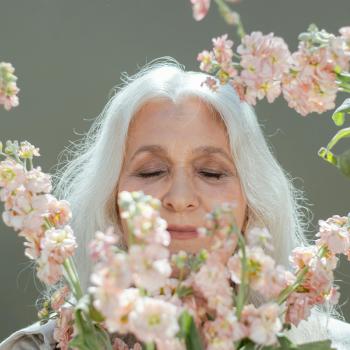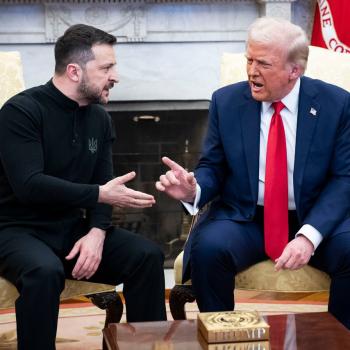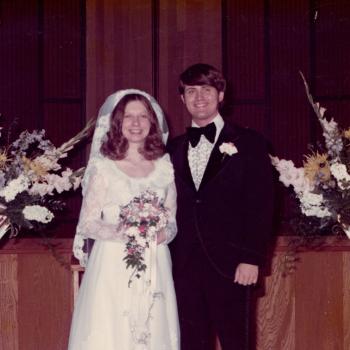Editors' Note: This article is part of the Patheos Public Square on the Future of Faith in America: New Religions. Read other perspectives here.
When I was first asked about the future of Paganism, I have to admit my reaction was not a hopeful one. Although my twenty years in the community are still as an eye-blink compared to my elders, I have seen trends in our community that concern me. When I first came to the community, I thought Paganism would save the world. Now, not only am I unsure of that, but unsure if that is even our proper role in the world. Still the question of our future got me thinking deeply about our collective role, and when looking at it through magickal eyes, I found hope. I do believe our voice is needed in the greater spiritual dialogue, even if I no longer believe ours is (or should be) the single "saving" voice.
With the growth of things we define as Pagan comes a lot of cognitive dissonance as we all use the same words, but often define them differently. Having no holy writ or religious authority is great for personal freedom and interpretation, but can make it difficult to collectively define values and goals. Yet such dissonance, creating a sense of paradox, is a fertile friction, central to the mysteries of Paganism.
As a practicing Witch, I harken back to our land-based roots and the image of the tree, with our future in both the newly-growing branches, stretching in different, and sometimes seemingly conflicting directions, and the deep, hidden roots. The future of Paganism is not in narrowly defining one path for all, but creating space for our branches and roots to grow. We each choose our own way, but our community must allow others their choices as well. That is our challenge: to protect and nurture the whole, even when we only partake in our particular parts of it.
Occultism and Religion
I started in Witchcraft. At the time, there was not a lot distinguishing Witchcraft from Paganism. It was an occult tradition, and drew not only upon ancient forms of Paganism, but upon the European occult and esoteric movements, including grimoires, alchemy, ceremony magick, holistic health, Freemasonry, Theosophy, and Spiritualism. As a system of magickal attainment, Witchcraft could be called a "religion," but it was deeply separate from mainstream religions where faith and dogma were paramount. I'm still uncomfortable participating in anything defined as "faith-based," as I see myself as a religious teacher who is not a person of faith, but of technique and experience. Change my experience and you change my "faith" as I'm unattached to the outer form.
Today, many come to Paganism philosophically, but do not seek the inner attainment of the Mysteries. An even larger number come to Paganism seeking to restore the ancient religions, but in a wholly religious sense for the greater community, rather than the work of the ancient mystery schools. The practice is about belief, faith, ancestry, and culture. Yet, mystery schools were not for everyone, and the mainstream Pagan religions of the ancient world served a purpose for the greater community, and provided a framework to support those Mysteries. The growth of the philosophical and religious branches is inevitable, so we should work together to make sure there is mutual support in the collective culture.
Public and Private Practice
In the older traditions of the Craft, things were private and secret. It was an underground mystery tradition, organized into small groups. Today, the number of seekers far outstrips the number of balanced, educated, ethical small groups. More and more shops have become community resource centers and more events are held and promoted in public without fear. Some feel making our practice so accessible has been a mistake, diluting it, while others feel it is a necessity if our work is to have an effect in the world.
Despite being an old-world occultist at heart, I advocate for public disclosure, transparency, and public institutions. As a tradition rooted in the sacredness of the world, I think we should develop and tend to sacred sites. As a tradition proclaiming the interconnectedness of all things, I think we should have community social services to help those in need. Our challenge is developing these resources in a Pagan philosophical and theological context. We are not "saving" anyone, but serving a greater whole and working toward the benefit of all. If you wish to work in secret, you can always do so, but seekers will still have a place to learn and practitioners will have an opportunity to develop culture and community with greater longevity.
One of those areas of longevity is our descendants. As a tradition that has generally found seekers raised in other religions, we are not wholly prepared to raise our own children in Pagan traditions. There is a tendency to withhold religion from children for fear of "pushing it" on them, leaving the children with little to no spiritual context. A minister in the Temple of Witchcraft, Silver Lyons, once told our council of ministers, "Everyone is talking about the ancestors, but I'm here for the children. We have to be thinking of them too." Those in the more esoteric occult orders don't see Paganism, Witchcraft, or Magick involved in family, but the development of magickal, Pagan families is inevitable, and harkens back to ancient Pagan families with household spiritual traditions.




